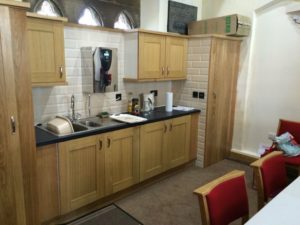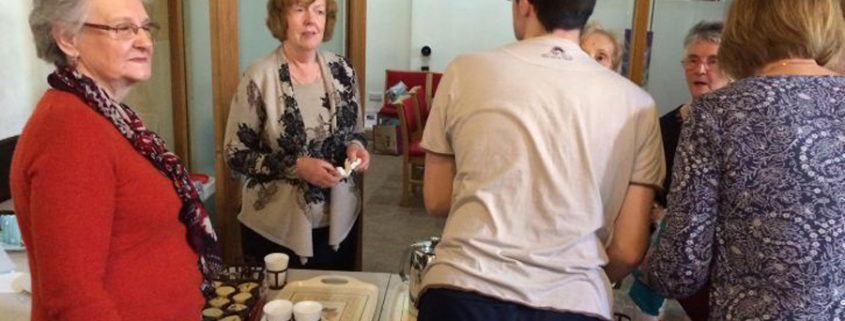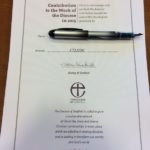A sermon at the Chrism Eucharist
Yesterday I was in St Peter’s Tankersley, one of the oldest churches in the Diocese.
 My reason for being there was to dedicate new building works. There is a new heating system, a new kitchen and space for children, a new organ, more flexible seating in the north aisle and a church extension to make room for a toilet. I always enjoy the blessing of a new water closet.
My reason for being there was to dedicate new building works. There is a new heating system, a new kitchen and space for children, a new organ, more flexible seating in the north aisle and a church extension to make room for a toilet. I always enjoy the blessing of a new water closet.
It’s a great re-ordering. But what inspired me most was the vision which shaped it. Eight years ago, Mr Charles Round, a member of the church then in his eighties, wrote this to the Rector, Keith Hale.
“The lead theft and the unfortunate resulting water damage to the organ may be a blessing in disguise which opens the door to a better use of the considerable space which the present pipe organ occupies. May I put the following ideas for your consideration? Instead of repairing the organ, clear out the organ loft and install a new electronic organ. The created area would provide a versatile and much needed space for our growing Sunday School….I feel it is time for objective, unemotional and realistic forward planning in order to assure the future continuous growth of our congregation and its influence in this parish of Tankersley”.
Charles is not in good health now and was unable to be present yesterday. But if he had been, he would have seen as I did, a wonderful new facility, filled with young children and a church ready to welcome the next generation.
“Enable with perpetual light
The dullness of our blinded sight”
Where do these words come from? We sing these words at every ordination service. They are part of the great hymn to the Holy Spirit. They echo the prayer of blind Bartimaeus: “My teacher, let me see again”[1]. They flow from the words of Jesus in Luke 4:
“The Spirit of the Lord is upon me because he has anointed me to bring good news to the poor. He has sent me to proclaim release to the captives, the recovery of sight to the blind, to let the oppressed go free”.
We gather together this evening to renew our commitment to ministry as lay ministers, as evangelists, as deacons, priests and bishops and as the whole people of God. Our prayer as we come, I suggest, should be the prayer of Bartimaeus: Lord, let me see again. For a vital part of the ministry we offer is vision: the ability to see a better future for the people of God and for God’s world.
“Enable with perpetual light the dullness of our blinded sight”. May the Lord help us to see again the purposes of God, the calling of the Church, the vision for our Diocese, the better future for our communities.
My God open our eyes and help us to see again a vision of God, Father, Son and Holy Spirit, at the centre of our life together. In the routine exercise of our ministry, we become blind. Like the Church in Laodicea we come this evening to ask for ointment for our eyes so that we may see Jesus afresh in this Holy Week and understand again the depth of our salvation even as we proclaim it to others.
Where is the vision for our ministry? Have our eyes become blind and our sight dull over this past year? Where will we find our healing?
The Book of Numbers tells the powerful story of twelve who were sent by Moses to spy out the land. It’s a cautionary tale. God has brought the people of Israel out of slavery in Egypt. They have passed through the Red Sea. They have received the law. They have travelled through the desert, guided by the pillar of cloud and the pillar of fire and sustained by daily bread from heaven. Now they stand on the threshold of the promised land.
Moses chooses 12 leaders, one from each tribe, to be the first to enter. Their task is clear. They are to see. They are to catch the vision of a land flowing with milk and honey. They are to witness the goodness and fruitfulness of the promised land. They are to come back and inspire the whole people of Israel. The land is good. God is leading us on. It is worth persevering. There is an immeasurably better future than slavery in Egypt. There is an infinitely richer life than wandering through the wilderness. Keep going. Press forward.
But that is not what happens. These twelve, “every one a leader” of the people lose their vision. They spend 40 days spying out the land. They return and speak to the people. There is indeed a rich land ahead, flowing with milk and honey. See, the fruit is good. But fear has gripped the spies. Their hearts are poisoned with despair.
Listen to what they say. The inhabitants of the land are giants. Their cities are large and strong. There are too many obstacles in the way. This is the most telling phrase. “To ourselves we seemed like grasshoppers and so we seemed to them.” Fear has corroded their perspective and their very identity.
Only two, Caleb and Joshua, sing a different song. They plead with the people to hold onto hope and a better future. This people have seen God do so much. This is the generation which saw the plagues in Egypt, the Passover, and the Red Sea. They have seen water flow from rock. But now they are gripped by fear. Rumour and terror and despair are infectious. They sap our courage. They prevent all forward movement.
The failure is a failure of leadership and vision. Disaster follows. The people rebel against God. They cry out to return to slavery in Egypt. They plead to be able even to die in the wilderness. The present reality, a parched desert, becomes more attractive than the future hope.
God in his mercy grants their request. This is a moment of judgement. For forty more long years they will wander aimlessly in the wilderness, a people going round in circles, until a whole generation have died. Only Caleb and Joshua, the leaders the keepers of the vision, will survive to lead the people into Canaan. Moses himself will come only to the threshold of what is promised. Why? Because the vision of the leaders of God’s people failed.
So let me ask you this as you come this evening to renew your commitment to the ministry to which God has called you. I ask myself the same question I ask you. What has happened to your vision? What has happened to your hope? How are you passing on vision and hope to the people of God in your parish and deanery and to one another? What are you doing to rekindle faith, to lead God’s people into a better future? Are you with Caleb and Joshua? Or with the ten who spread despair and counsel God’s people to be content with slavery and satisfied with the desert?
Every priest is called to be a person of vision. In the words of the ordinal, priests “are to proclaim the word of the Lord and to watch for the signs of God’s new creation. They are to be messengers, watchmen and stewards of the Lord.”
What are you doing to nurture the vision of God in your own life and in the life of your community? The God who has called you is the maker of heaven and earth, the God who breathes life into creation, whose very nature is love and compassion and mercy. The God who has called you is Jesus Christ, the wisdom and love of God made visible, Jesus Christ who lays down his life for the world, whose passion and death brings new life to humankind. The God who calls us is the Spirit, brooding over the universe bringing about the new creation.
What are you doing to nurture a new vision for God’s world in your community? A vision for which the world cries out: a vision of peace, of justice, of freedom from slavery, a vision of a world in which children do not die, old people live in dignity and people enjoy lives of purpose and the fruits of their own labours?
What are you doing to nurture and catch a fresh vision for God’s church? A vision which is richer and deeper than a group of people growing old together. We are called to be a church filled with God’s new life, constantly seeking ways to model our life on the character of Jesus Christ, continually striving to proclaim the faith afresh in each generation.
Each of us is called to different ministries. Each of us has been given different gifts. Some to ordained ministry and some to lay ministries. Some to be evangelists, pastors and teachers. Some to be deacons, priests or bishops.
Yet all of us are called to be women and men of vision, called to see a different future for the Church, called to watch for signs of God’s new creation, called to a vision of God at the heart of all our living.
As we come this evening to renew our commitment to ministry, as you come before God in the silence in these coming days of Holy Week, as you perhaps are led to seek prayers and anointing for healing, let this be the focus of our prayers: the renewal of our vision of God, our vision for God’s church and our vision for God’s world.
“Enable with perpetual light
The dullness of our blinded sight”.
“My teacher, let me see again”
“The Spirit of the Lord is upon me because he has anointed me to bring good news to the poor. He has sent me to proclaim release to the captives, the recovery of sight to the blind, to let the oppressed go free.”
+ Steven Sheffield
[1] Mark 10.51


